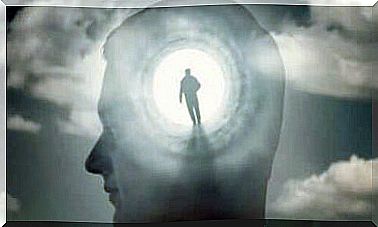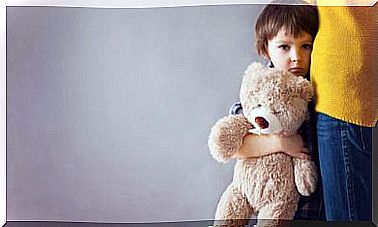Embarrassment: How It Affects Us

There are several different types of embarrassment. Although they mostly have the same physiological consequences, they tend to vary in terms of cognitive treatment and the circumstances that produce them. In this article, we will tell you more about why we often feel embarrassed.
Recently, a renowned American psychoanalyst named Joseph Burgo classified four types of embarrassment that he considers to be fundamental. He says that today people are more open to talking about what they are embarrassed about and what they are ashamed of. At the same time, he explains how he thinks each of these variants can affect us.
In his book from 2018, Burgo presents four perspectives that we can use to study this phenomenon. But before we start looking at the differences, we need to take a closer look at what these perspectives have in common:
- You get red in the face, neck or chest.
- You want to escape or avoid situations.
- You want to disappear or swap places with someone else.
- One is not able to look the other person in the eye.
- Transient mental confusion.

Is embarrassment always negative?
Many people have a very negative view of embarrassment. But those who are in charge of studying it perceive it as more varied in nature and with more moderate and less drastic consequences.
Somehow, embarrassment is a relatively common aspect of our daily lives that is hard to avoid. But it may not be as toxic or negative as we tend to think. Burgo made some interesting suggestions in his book. Based on more than 35 years of clinical observations, he pointed out the relationship that exists between embarrassment and self-esteem.
In this way, he takes into account that the positive lessons that one can learn by interacting with the various states of embarrassment can actually override the negative effect of the inhibitions that cause them. The message that this author offers us is both optimistic and demystifying.
We do not often stop to consider all the different aspects of our embarrassment states. We often hide our embarrassment because we find it so uncomfortable. This can manifest itself in many ways:
- Dependence.
- Perfectionism.
- Self-pity.
- Promiscuity.
- Narcissism.
The different types of embarrassment and their influence
One of the reasons it’s easier to talk about the subject today is because people tend to be less afraid to talk about the things that embarrass them. People are generally less reluctant than before.
Today we are encouraged to show our true selves. We listen to the advice that tells us to live in harmony with our qualities and our minds. This is why people are more ready to look inward and share the things that make them embarrassed. Positive psychology, which is so prevalent today, encourages us to accept our less desirable traits with optimism.
Burgo works with embarrassment in his work in everyday life. It is a psychological process that, like so many others, manifests itself in the course of people’s daily tasks. For this reason, dealing with it is a natural and acceptable phenomenon.
As we mentioned earlier, the author suggests that we can distinguish between four types of embarrassment.
1. Unrequited love
Maybe you loved someone where the love was not reciprocated or where the person you loved rejected you. Maybe you felt like the person was leaving you. In many of these situations, embarrassment turns into humiliation.
We know that children can start experiencing this kind of embarrassment early in their lives. When babies do not receive the love they need from their mother after making several attempts to get attention, they experience something resembling embarrassment. The common expression is: “one-sided love”.
In the field of psychology, experts have observed that individuals who have been brought up in this way – with mothers who have not expressed enough empathy in relation to their child – show clear pain as a result of this one-sided love. This conditions the person’s normal development in a negative way.

2. Unwanted exposure
This is not so often a dilemma. It occurs when dismissing others in public, or if a person, for example, enters a room while you are naked.
In general, this type of embarrassment – due to its lack of frequency and relative lack of seriousness – is transient and not very relevant to the psychological well-being of the individual. However, depending on the person’s disposition and the intensity of the feeling experienced, in some cases it may adversely affect a person or cause some form of trauma.
Failure to meet expectations or disappointment
Here we are talking about the type of embarrassment that arises when one has tried to achieve a goal but which has not succeeded. You feel embarrassed because of the expectations you had created in yourself, or because of the expectations that others had of you.
In terms of severity and potential consequences, it is similar to the previous type of embarrassment. Some everyday examples that may generate this feeling of embarrassment are:
- One is not able to maintain the expected progress at work.
- The end of a friendship.
- A failed romantic relationship.
4. Exclusion or marginalization
As a social being, it is quite normal that you want to fit into a group and feel that you belong. This principle applies in almost all areas of life: work, romantic relationships, friendships, etc. But there are times when this sense of belonging can be threatened.
In these cases, a high self-esteem and the ability to make correct assumptions will act as a defense against the negative influence of this kind of embarrassment.
A good attitude would be the following: “ My friends have not invited me to the barbecue today because they know how much I work, so they probably think I’m too busy and they do not want to disturb me; it’s not because they do not bother to be with me. ”

Conclusion on embarrassment
Embarrassment can be exhausting and annoying. It can be so bad that in some cases it can be a crucial element in your emotional balance and in the way your personality develops.
In fact, some negative personality traits such as narcissism or self-harm are typically associated with a lack of resource to confront embarrassment.
Saying no to a child can create a very mild form of embarrassment, as it tends to disrupt a child’s natural impulse to explore. But this kind of embarrassment usually does not last very long, nor does it have any kind of long-lasting consequences.
Embarrassment in children
So unless we are dealing with a person whose childhood has been plagued with abuse, neglect or trauma, the small amounts of embarrassment that may have accumulated will not have any permanent, negative effects. For this reason, all parents should know that it is okay to say no to a child’s wishes once in a while.
But there are those who have been severely affected by embarrassment or shame. If they decide to seek psychological help – which is something we strongly recommend – the therapist should carefully dive into the client’s past and gradually discover the person’s personal defenses once he or she has won the client’s trust.
It takes time and effort to build trust. This is the case with people who have deep feelings of embarrassment, shame and humiliation. It can be very disturbing for them when others judge them. They may even be afraid that the therapist will judge them.









